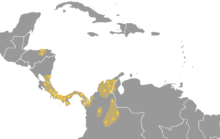Uwa people

Map of Chibcha languages; the U'wa represent the easternmost yellow dot
|
|
| Total population | |
|---|---|
| (7-8,000) | |
| Regions with significant populations | |
| Arauca, Boyacá, Casanare, Santander & Northern Santander | |
| Languages | |
| Uw Cuwa, Colombian Spanish | |
| Religion | |
| Animist | |
| Related ethnic groups | |
| Muisca, Lache, Guane, Guahibo |
The U'wa are an indigenous people living in the cloud forests of northeastern Colombia. Historically, the U'wa numbered as many as 20,000, scattered over a homeland that extended across the Venezuela-Colombia border. Some 7-8,000 U'wa are alive today.
The U'wa are known to neighboring indigenous peoples as "the thinking people" or "the people who speak well". They were formerly called Tunebo, but today prefer to be known as U'wa, meaning "people".
They gained international visibility in a 14-year-long struggle to prevent oil drilling on their land, which secured the withdrawal of Royal Dutch Shell and Occidental Petroleum (Oxy), and continues as Ecopetrol and Repsol YPF seek to drill on their land. Their representative to the outside world in this struggle, Berito Kuwaru'wa, won the Goldman Environmental Prize in 1998. The conflict came to a head as Oxy prepared to drill at the Gibraltar 1 test site. The U'wa, who had previously threatened to commit mass suicide if the oil extraction project went forward, constructed a small village on the site of the drillsite. They also set up numerous roadblocks and a coordinated (together with neighboring campesinos and the Guahibo) a regional social strike that paralyzed the surrounding area. Although the Colombian military dislodged the protesters from the site, no commercially viable deposits were found. The U'wa were then in a new dispute with Ecopetrol, which was seeking to prospect for oil on their lands, after legal battles and non-violent protests, Ecopetrol withdrew.
The U'wa people live in northeastern Colombia, in the departments of Arauca, Boyacá, Casanare, Santander and Northern Santander. Historically, they also populated what is now Venezuela.
...
Wikipedia
